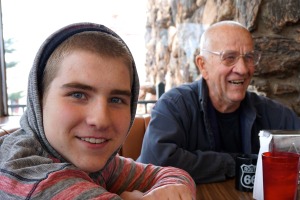I recently had the chance to attend a Christian ministry conference and since I am me, I scoured the listing of workshops to see what I could find that was related to Next Gen. Bingo! “Holistic Discipleship for the Next Generation.” That sounded perfect and right up my alley so off I went.
 The session started with some brief introductions and testimonies from the leaders, one of which was a young man who had been influenced by the program they were going to talk about. In his introduction he mentioned a number of things that were most influential on him as he grew up and all of those were people. He talked about the adults and mentors that came alongside him and spoke into his life; how they showed up at his games and took him on family trips and spent time talking to him and engaging him in his growing faith.
The session started with some brief introductions and testimonies from the leaders, one of which was a young man who had been influenced by the program they were going to talk about. In his introduction he mentioned a number of things that were most influential on him as he grew up and all of those were people. He talked about the adults and mentors that came alongside him and spoke into his life; how they showed up at his games and took him on family trips and spent time talking to him and engaging him in his growing faith.
In most Christian circles, we’d call that discipleship.
So, I got really excited because surely if one of the main presenters spent most of his introduction talking about the intergenerational relationships he had experienced and the deep impact they had on his faith and spiritual formation, then this workshop would most certainly include these things in their “holistic” approach.
For the rest of the workshop I waited to hear about how these relationships were formed and cultivated; about how we could put into practice activities or even programs that were geared toward growing those relationships and creating intentional space in our churches for them to mature and develop.
Unfortunately, that did not happen. In fact, for the remainder of the workshop, the words “discipleship”, “mentor”, or “intergenerational” were never mentioned. Not even once. We did talk a lot about programming, curriculum, activities, and fun and creative ways to teach kids about God. We practiced some fun imagining, talked about format and presentation, ran through some kidmin scenarios and were given insight to a lot of content.
But never once did the presenters talk about ways to encourage intergenerational connections with children and youth outside of the programmed times. There was no conversation about mentoring and the importance of giving kids access to those who are more mature in the faith to help them to grow.
Discipleship was programmatic, aimed primarily at increasing knowledge and, frankly, getting kids to say a prayer so that they’d be saved with little to no conversation about how to take that faith deeper.
Please don’t hear this as me knocking this group. They are doing great things in their city and God is using them. But if we are talking about “holistic discipleship” and we are not talking about actual discipleship, mentoring or generational connectivity, we are missing the mark.
Our faith is primarily passed from one generation to another and it’s not passed in a class or an after-school program or a club that meets once a week.
All of those things are good and helpful and even needed, but those are not discipleship.
Discipleship is first of all relational; it requires time spent together in relationship, learning and growing and worshipping together. Mentorship is a deeper connection where one person who is more mature pours into and walks alongside another in spiritual apprenticeship.
Generational connections have to be more than just someone who volunteers to teach a class or host a club once a week but crosses over into a meaningful relationship where love is experience and pain is processed and life is shared.
And, the presenter at this workshop agrees. After the workshop, I spoke with the presenter who had shared his testimony at the beginning and I told him how much those stories had meant to me. And then I gently pushed back on the complete absence of discipleship and mentorship in the workshop and the focus on programs and curriculum and projects. First he looked stunned and then he shook his head and said, “You’re right. All those things were great but the people made the difference. The people who didn’t just show up for the class but connected with me outside of class and met with me and talked to me about being a Christian every day.”
Holistic discipleship had to be more. It has to take the next step.
It can’t just be found in a Sunday School class or an after-school club. It is found when hearts connect in a relationship that leads to faith formation and spiritual growth both in the home and in the church.
It’s found when we get outside the program or curriculum or church walls and learn each other’s names and eat a meal together and go to a game to cheer each other on and show up for dance recitals and school plays or just go fishing together.
It’s found when we take time to develop our connections and move beyond the starting point that classes and clubs might be and into relationship.
That’s how Jesus did it with his disciples and that’s how they did it with their disciples and that’s how we must do it with the next generation.
Holistic discipleship is not a curriculum. It’s so much more.
For more information about
- Kids in Worship
- Determining which Type of Family Ministry model works best for your church
- Encouraging the continued conversation through Practical Discipleship at Home
- And much more!
Check out to ReFocus Ministry or “like” our Facebook page. Join our conversation at theReFocus Family and Intergen Ministry group on Facebook.
About the author
 Christina Embree is wife to Pastor Luke, mom to three wonderful kids, and family minister at Nicholasville UMC. She is passionate about seeing churches partnering with families to encourage faith formation at home and equipping parents to disciple their kids in the faith. Currently studying Family, Youth and Children’s Ministry at Wesley Seminary, she also blogs at www.refocusministry.org and is a contributing blogger at D6 Family, Seedbed, and ChildrensMinistryBlog.com
Christina Embree is wife to Pastor Luke, mom to three wonderful kids, and family minister at Nicholasville UMC. She is passionate about seeing churches partnering with families to encourage faith formation at home and equipping parents to disciple their kids in the faith. Currently studying Family, Youth and Children’s Ministry at Wesley Seminary, she also blogs at www.refocusministry.org and is a contributing blogger at D6 Family, Seedbed, and ChildrensMinistryBlog.com


